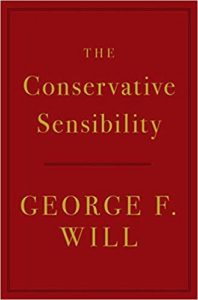

- It would help if people would put their electronic devices away from the center of their existences and pick up a book.
- —George F. Will, The Conservative Sensibility (p. 2)1
Contemporary political debates take place on Twitter, with participants choosing topics that inspire the most outrage at the moment. If people pick up George Will’s opus, they will find it hefty, at over 600 pages in hardcover (I myself read the Kindle edition). Readers of The Conservative Sensibility will not find Donald Trump or Antonia Ocasio-Cortez, but they will find instead John Locke, James Madison, and Woodrow Wilson.
Will believes that conservative thought, which incorporates significant libertarian elements, is superior to the progressive mindset. He writes,
- American politics can be considered a tale of three liberalisms, the first of which, classical liberalism, teaches that the creative arena of human affairs is society, as distinct from government. Government’s proper function is to protect the conditions of life and liberty, primarily for the individual’s private pursuit of happiness. This is now called conservatism. Until the New Deal, however, it was the Jeffersonian spirit of most of the Democratic Party. FDR’s New Deal liberalism was significantly more ambitious. He said that until the emergence of the modern industrial economy, “government had merely been called upon to produce the conditions within which people could live happily, labor peacefully and rest secure.” Now it would be called upon to play a grander role. It would not just provide conditions in which happiness, understood as material well-being, could be pursued. Rather, it would become a deliverer of happiness itself. Government, FDR said, has “final responsibility” for it. This “middle liberalism” of the New Deal supplemented political rights with economic rights. The New Deal, the modern state it created, and the class of people for whom the state provided employment led to the third liberalism, that of the 1960s and beyond. This “managerial liberalism” celebrates the role of intellectuals and other policy elites in rationalizing society from above, wielding the federal government and the “science” of public administration, meaning bureaucracy.
It appears to me that on campus today we are seeing another phase in the evolution of liberalism. With its hostility toward free speech and its dissolution of human individuality into gender/racial identity, I would call it anti-liberalism.
Concerning classical liberalism, Will writes
- The law’s primary purposes are to keep the peace and facilitate quotidian transactions—to resolve disputes and regularize behaviors and expectations. The law is not supposed to be salvific; it is not written to perfect either the individual or the community. When government undertakes, by methodical policy, to improve and fix the citizenry’s consciousness, the citizenry ceases to be composed of citizens, properly understood.
For Will, the apotheosis of the first phase of liberalism was the American Founding, with a capital F. Madison and the other Founders took at as given that human nature made us sufficiently equal to deserve identical treatment under the law, sufficiently different to benefit from liberty and autonomy, sufficiently bellicose to require a government that could resolve disputes peacefully, and sufficiently factional that preventing one coalition from dominating the rest required a system of checks and balances.
Blank Slatism
According to Will, classical liberals (or conservatives) take these aspects of human nature as given. Meanwhile, “The crux of modern radicalism is that human nature has no constancy.”
Will argues that this plastic view of human nature is embedded in the progressive movement.
- The vehemence of political progressives’ recoil from the Founders’ philosophy is explained by the progressives’ investment in the idea that human beings are essentially blank slates on which pretty much anything can be written if the writers know the techniques for doing so… The theory that a properly organized and governed society can write progress on humanity’s blank slate radically raises the stakes of politics. It also increases the grandeur of government’s role.
If Madison and the other Founders are Will’s heroes, then iconic progressive Woodrow Wilson is one of Will’s chief villains.
- History, Wilson thought, would produce unity in the public mind. Progress would pull the fractious public up from rival particularities, to a harmony that Madison, who was wedded to a static understanding of human nature, could not fathom… mankind will have pretty much left politics behind and entered what Wilson serenely anticipated as the age of administration.
To this day, progressives harbor a mindset in which society’s objectives are widely shared, technocrats know how these objectives can be achieved, and what stands in the way are the illegitimate interests and retrograde beliefs of a benighted minority. Will comments,
- But as solicitous government permeates society with its superintending, society responds in an inconvenient way. As government’s interests multiply, so do interest groups. As government seeks to supplement and even supplant market forces in the allocation of wealth and opportunity, there is a corresponding and commensurate multiplication of factions determined to influence the actions of activist government.
Progressivism ratcheted up its influence during the administration of Franklin Roosevelt. FDR sold the public on a new vision for government. Whereas previously its role had been to secure liberty, its new role was to provide entitlements.
- The unspoken but unmistakable supposition is that the more entitlements people enjoy, the more rights they have—and that rights, like entitlements, trickle down from government.
Moreover, under the threat of Roosevelt’s “court-packing” plan, the Supreme Court stopped enforcing Constitutional protections against the Federal government’s encroachment on economic liberty. Will devotes an entire chapter to advocating strong judicial action to restore economic liberty and curtail the administrative state.
Finally, President Lyndon Johnson fostered a vision of government that understood no limits concerning what it could achieve. It would eliminate poverty, promote equality of outcomes, and ensure that everyone would enjoy a life of “meaning.”
- Johnson also said people are shaped by “a hundred unseen forces.” That also is true. But what was new was the idea that government could and should master those forces, the unseen and the seen, and, for that matter, should master “the world.” The planted axiom was that, because government frames society, government is complicit in, and hence morally responsible for, all social outcomes and should make them come out right.
With this phase of liberalism, Will writes,
- government has metastasized recklessly, and one of conservatism’s missions is to temper such government’s hubris and over-reaching. This can be accomplished only by shifting the winds of public opinion. So the central political problem for conservatives is to get the public to consent to government that refuses to fulfill many of their desires.
The Culture War
In a chapter on culture, Will writes
- Conservatives worry that the severest cost of solicitous government is not monetary but moral. This cost is measured in the diminution of personal responsibility and of private forms of social provision.
As government gets stronger, families are weaker. The traditional institutions of civil society also have become weaker.
Will despairs of contemporary trends in education.
- The modern revolution in higher education has been its embrace of a contrary mission of liberation. This is the mission of emancipating young people from ideas and norms formed in, and by, an imperfect past. This is to be accomplished, in part, by inoculating students with historicism, which is the principle that every principle is the product of a historical context and is no more durable or valuable than the context was or is.
A bit later, Will writes that contemporary American educators are
- indulging in the pleasure known as presentism, which is the practice of judging the past by the standards of the present. This amalgam of ignorance and arrogance invariably leads the complacent people doing the judging to flatter themselves as much more discerning, sensitive, and generally better than, say, George Washington, who did not free his slaves, or Abraham Lincoln, who never allied himself with abolitionists.
It would seem, then, that obtaining the lessons of history is not straightforward. On the one hand, the historicist emphasizes historical context, thereby denying that older ideas remain relevant today. But the presentist denies historical context, making historical figures seem worse than they are.
Will faces a similarly tricky problem in assigning paramount importance to the fixity of human nature. Taken to an extreme, this would lead one to believe that all societies should benefit equally from our system of government. But Will sees that such a view could justify recklessly interventionist foreign policy.
- The assumption that “the human heart” is the same everywhere, and hence that everyone is more or less alike, give or take a few cultural differences, can lead to interesting misjudgments…
- The “human heart theory” of foreign policy died in Iraq.
Accordingly, Will qualifies his view of constant human nature.
- Human nature is real and unchangeable; national characters, however, are real but, over a long time, changeable… Different nations involve different notions of justice. A “community” consists of people held together by a broad, deep consensus about justice under a common sovereignty.
Conclusion
It strikes me that conservative and libertarian intellectuals have very low status in contemporary political life. Instead, the contest is between progressive elites on the one hand and populists on the other.
The Conservative Sensibility demonstrates that the conservative and libertarian intellectual perspective deserves respect. But what such a book can achieve in a Twitter culture is uncertain.
*Arnold Kling has a Ph.D. in economics from the Massachusetts Institute of Technology. He is the author of several books, including Crisis of Abundance: Rethinking How We Pay for Health Care; Invisible Wealth: The Hidden Story of How Markets Work; Unchecked and Unbalanced: How the Discrepancy Between Knowledge and Power Caused the Financial Crisis and Threatens Democracy; and Specialization and Trade: A Re-introduction to Economics. He contributed to EconLog from January 2003 through August 2012.
Read more of what Arnold Kling’s been reading. For more book reviews and articles by Arnold Kling, see the Archive.

Comments are closed.